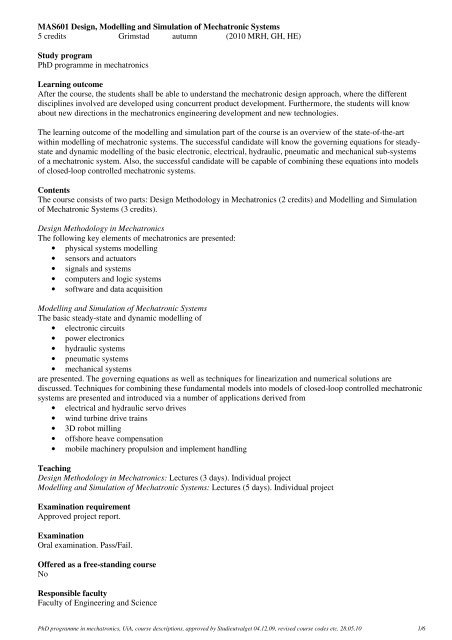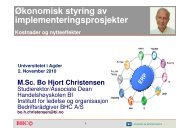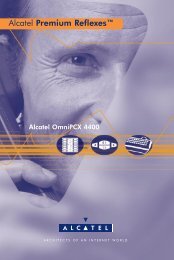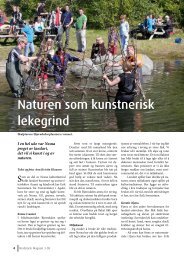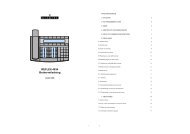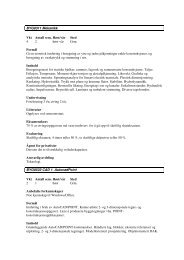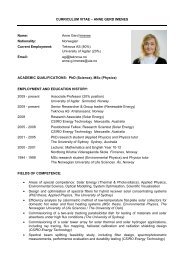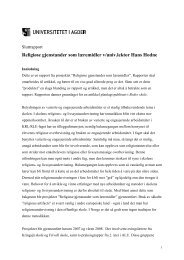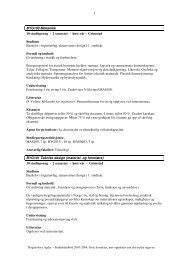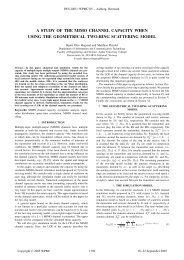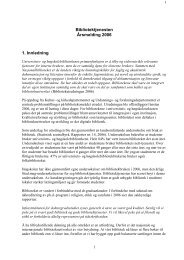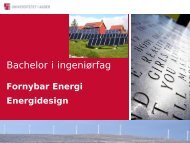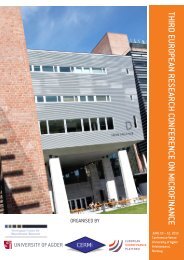MAS601 Design, Modelling and Simulation of Mechatronic Systems ...
MAS601 Design, Modelling and Simulation of Mechatronic Systems ...
MAS601 Design, Modelling and Simulation of Mechatronic Systems ...
Create successful ePaper yourself
Turn your PDF publications into a flip-book with our unique Google optimized e-Paper software.
<strong>MAS601</strong> <strong>Design</strong>, <strong>Modelling</strong> <strong>and</strong> <strong>Simulation</strong> <strong>of</strong> <strong>Mechatronic</strong> <strong>Systems</strong><br />
5 credits Grimstad autumn (2010 MRH, GH, HE)<br />
Study program<br />
PhD programme in mechatronics<br />
Learning outcome<br />
After the course, the students shall be able to underst<strong>and</strong> the mechatronic design approach, where the different<br />
disciplines involved are developed using concurrent product development. Furthermore, the students will know<br />
about new directions in the mechatronics engineering development <strong>and</strong> new technologies.<br />
The learning outcome <strong>of</strong> the modelling <strong>and</strong> simulation part <strong>of</strong> the course is an overview <strong>of</strong> the state-<strong>of</strong>-the-art<br />
within modelling <strong>of</strong> mechatronic systems. The successful c<strong>and</strong>idate will know the governing equations for steadystate<br />
<strong>and</strong> dynamic modelling <strong>of</strong> the basic electronic, electrical, hydraulic, pneumatic <strong>and</strong> mechanical sub-systems<br />
<strong>of</strong> a mechatronic system. Also, the successful c<strong>and</strong>idate will be capable <strong>of</strong> combining these equations into models<br />
<strong>of</strong> closed-loop controlled mechatronic systems.<br />
Contents<br />
The course consists <strong>of</strong> two parts: <strong>Design</strong> Methodology in <strong>Mechatronic</strong>s (2 credits) <strong>and</strong> <strong>Modelling</strong> <strong>and</strong> <strong>Simulation</strong><br />
<strong>of</strong> <strong>Mechatronic</strong> <strong>Systems</strong> (3 credits).<br />
<strong>Design</strong> Methodology in <strong>Mechatronic</strong>s<br />
The following key elements <strong>of</strong> mechatronics are presented:<br />
• physical systems modelling<br />
• sensors <strong>and</strong> actuators<br />
• signals <strong>and</strong> systems<br />
• computers <strong>and</strong> logic systems<br />
• s<strong>of</strong>tware <strong>and</strong> data acquisition<br />
<strong>Modelling</strong> <strong>and</strong> <strong>Simulation</strong> <strong>of</strong> <strong>Mechatronic</strong> <strong>Systems</strong><br />
The basic steady-state <strong>and</strong> dynamic modelling <strong>of</strong><br />
• electronic circuits<br />
• power electronics<br />
• hydraulic systems<br />
• pneumatic systems<br />
• mechanical systems<br />
are presented. The governing equations as well as techniques for linearization <strong>and</strong> numerical solutions are<br />
discussed. Techniques for combining these fundamental models into models <strong>of</strong> closed-loop controlled mechatronic<br />
systems are presented <strong>and</strong> introduced via a number <strong>of</strong> applications derived from<br />
• electrical <strong>and</strong> hydraulic servo drives<br />
• wind turbine drive trains<br />
• 3D robot milling<br />
• <strong>of</strong>fshore heave compensation<br />
• mobile machinery propulsion <strong>and</strong> implement h<strong>and</strong>ling<br />
Teaching<br />
<strong>Design</strong> Methodology in <strong>Mechatronic</strong>s: Lectures (3 days). Individual project<br />
<strong>Modelling</strong> <strong>and</strong> <strong>Simulation</strong> <strong>of</strong> <strong>Mechatronic</strong> <strong>Systems</strong>: Lectures (5 days). Individual project<br />
Examination requirement<br />
Approved project report.<br />
Examination<br />
Oral examination. Pass/Fail.<br />
Offered as a free-st<strong>and</strong>ing course<br />
No<br />
Responsible faculty<br />
Faculty <strong>of</strong> Engineering <strong>and</strong> Science<br />
PhD programme in mechatronics, UiA, course descriptions, approved by Studieutvalget 04.12.09, revised course codes etc. 28.05.10 1/6
MAS602 Advanced Control <strong>and</strong> Robotics<br />
5 credits Grimstad spring (2010 GH, HRK, TAH)<br />
Study program<br />
PhD programme in mechatronics<br />
Learning outcome<br />
The learning outcome <strong>of</strong> the course is insight into current research topics within advanced control systems <strong>and</strong><br />
robotics. The successful c<strong>and</strong>idate will have knowledge <strong>of</strong> the state-<strong>of</strong>-the-art within a number <strong>of</strong> topics related to<br />
analysis <strong>and</strong> design <strong>of</strong> multivariable <strong>and</strong> nonlinear systems.<br />
Contents<br />
The course presents a number <strong>of</strong> selected topics within state-<strong>of</strong>-the-art in advanced control <strong>and</strong> robotics research.<br />
Emphasis is on multivariable, non-linear systems. The course will contain selected topics from the following list:<br />
• Nonlinear dynamic modelling <strong>of</strong> robotic systems (Euler-Lagrange, Newton-Euler)<br />
• Independent Joint Control <strong>and</strong> Multivariable Control <strong>of</strong> Robots<br />
• Force Control<br />
• Feedback Linearisation<br />
• Variable Structure <strong>and</strong> Adaptive Control, Sliding Mode Control<br />
• Model Predictive Control (MPC)<br />
• Adaptive Backstepping Techniques<br />
• Multivariable Robust Control (H-Infinity)<br />
• Quantitative Feedback Theory (QFT)<br />
• Linear Matrix Inequalities (LMI)<br />
Teaching<br />
Lectures (8 days). Exercises<br />
Examination<br />
Oral examination. Pass/Fail.<br />
Offered as a free-st<strong>and</strong>ing course<br />
No<br />
Responsible faculty<br />
Faculty <strong>of</strong> Engineering <strong>and</strong> Science<br />
PhD programme in mechatronics, UiA, course descriptions, approved by Studieutvalget 04.12.09, revised course codes etc. 28.05.10 2/6
MAS701 Fluid Power <strong>Systems</strong> <strong>Design</strong><br />
5 credits Grimstad spring (2011 MRH)<br />
Study program<br />
PhD programme in mechatronics<br />
Recommended previous knowledge<br />
<strong>MAS601</strong> or equivalent<br />
Learning outcome<br />
The learning outcome <strong>of</strong> the course is insight into current research topics within fluid power systems design. The<br />
successful c<strong>and</strong>idate will have knowledge <strong>of</strong> the state-<strong>of</strong>-the-art within a number <strong>of</strong> topics related to analysis <strong>and</strong><br />
design <strong>of</strong> hydraulically actuated mechatronic systems.<br />
Contents<br />
The course presents a number <strong>of</strong> selected topics within state-<strong>of</strong>-the-art in hydraulic system research. Emphasis is on<br />
model based design <strong>of</strong> closed loop controlled hydraulic systems.<br />
• Advanced modelling concepts<br />
• System design - criteria, design variables, optimization<br />
• Stability in hydraulics systems<br />
• Single actuator control schemes<br />
• PLS controlled servohydraulics<br />
• Digital displacement pumps<br />
• Load sensing systems<br />
• Separate meter-in separate meter-out valves<br />
• Tool point control<br />
• Offshore heave compensation systems<br />
Teaching<br />
Lectures (8 days). Individual project<br />
Examination requirement<br />
Approved project report.<br />
Examination<br />
Oral examination. Pass/Fail.<br />
Offered as a free-st<strong>and</strong>ing course<br />
No<br />
Responsible faculty<br />
Faculty <strong>of</strong> Engineering <strong>and</strong> Science<br />
PhD programme in mechatronics, UiA, course descriptions, approved by Studieutvalget 04.12.09, revised course codes etc. 28.05.10 3/6
MAS702 Electromagnetic <strong>Modelling</strong><br />
5 credits Grimstad spring (2011 OMM)<br />
Study program<br />
PhD programme in mechatronics<br />
Recommended previous knowledge<br />
<strong>MAS601</strong> or equivalent<br />
Learning outcome<br />
After completing the course, the successful student will have a sufficient underst<strong>and</strong>ing <strong>of</strong> generalized theory <strong>of</strong><br />
AC electrical machines (dq-theory), enabling them to apply these principles in advanced control <strong>of</strong> induction motor<br />
drives; <strong>and</strong> have a sufficient underst<strong>and</strong>ing <strong>of</strong> mathematical formulations for static <strong>and</strong> quasistatic electromagnetic<br />
field problems, enabling them to apply these principles in analysis <strong>and</strong> design <strong>of</strong> certain mechatronic system<br />
components.<br />
Contents<br />
Part 1: Advanced modelling <strong>of</strong> electrical machines. Space vectors, dq-theory <strong>and</strong> vector control <strong>of</strong> induction motor<br />
drives.<br />
Part 2: Short review <strong>of</strong> Maxwell’s equations. Formulations <strong>and</strong> solutions for selected static <strong>and</strong> quasistatic<br />
electromagnetic field problems.<br />
Teaching<br />
Lectures, exercises <strong>and</strong> project work (individual or groups <strong>of</strong> 2-3 students).<br />
Examination requirement<br />
Approved project report.<br />
Examination<br />
Oral examination. Pass/Fail.<br />
Offered as a free-st<strong>and</strong>ing course<br />
No<br />
Responsible faculty<br />
Faculty <strong>of</strong> Engineering <strong>and</strong> Science<br />
PhD programme in mechatronics, UiA, course descriptions, approved by Studieutvalget 04.12.09, revised course codes etc. 28.05.10 4/6
MAS703 Analysis <strong>of</strong> Dynamic Mechanical <strong>Systems</strong><br />
5 credits Grimstad spring (2011 MKE, KGR)<br />
Study program<br />
PhD programme in mechatronics<br />
Recommended previous knowledge<br />
<strong>MAS601</strong> or equivalent<br />
Learning outcome<br />
The learning outcome <strong>of</strong> the course is insight into current research topics within modelling <strong>of</strong> dynamic multibody<br />
systems. The successful c<strong>and</strong>idate will have knowledge <strong>of</strong> the state-<strong>of</strong>-the-art within a number <strong>of</strong> topics related to<br />
analysis <strong>of</strong> dynamic mechanical systems.<br />
Contents<br />
The course consists <strong>of</strong> two parts: Multibody Dynamics <strong>and</strong> Vibrations (3 credits) <strong>and</strong> Applied Fracture Mechanics<br />
<strong>and</strong> Reliability (2 credits).<br />
Multibody Dynamics <strong>and</strong> Vibrations<br />
The course presents a number <strong>of</strong> selected topics within state-<strong>of</strong>-the-art in modelling <strong>of</strong> dynamic multibody systems.<br />
Special emphasis is put on flexible systems <strong>and</strong> the associated vibrational phenomena.<br />
• Advanced modelling concepts<br />
• Choice <strong>of</strong> coordinates<br />
• Rigid body dynamics<br />
• Inverse versus forward dynamic analysis<br />
• Vibrational aspects<br />
1. Lumped flexibility<br />
2. FE-models<br />
3. FE-beam models<br />
4. Mode shapes<br />
• Vibration theory<br />
Applied Fracture Mechanics <strong>and</strong> Reliability<br />
Fatigue in machined <strong>and</strong> welded structures<br />
• crack initiation <strong>and</strong> growth<br />
• low, medium <strong>and</strong> high cycle fatigue<br />
• post weld treatment<br />
Finite element based fatigue analysis <strong>of</strong> welded structures<br />
• hot spot method<br />
• toe curvature approach<br />
Reliability assessment <strong>of</strong> mechatronic systems<br />
Teaching<br />
Multibody Dynamics <strong>and</strong> Vibrations: Lectures (5 days). Exercises<br />
Applied Fracture Mechanics <strong>and</strong> Reliability: Lectures (3 days). Exercises<br />
Examination<br />
Oral examination. Pass/Fail.<br />
Offered as a free-st<strong>and</strong>ing course<br />
No<br />
Responsible faculty<br />
Faculty <strong>of</strong> Engineering <strong>and</strong> Science<br />
PhD programme in mechatronics, UiA, course descriptions, approved by Studieutvalget 04.12.09, revised course codes etc. 28.05.10 5/6
MAS704 Energy Conversion<br />
5 credits Grimstad spring (2011 TOS)<br />
Study program<br />
PhD programme in mechatronics<br />
Recommended previous knowledge<br />
<strong>MAS601</strong> or equivalent<br />
Learning outcome<br />
After the course is completed, the students will have an overview <strong>of</strong> the relevant types <strong>of</strong> energy conversion<br />
principles. Furthermore, the students will know about some <strong>of</strong> the current research topics <strong>and</strong> research<br />
methodology within this field.<br />
Contents<br />
The course will contain selected topics from the following list:<br />
• Principal Fuels for Energy Conversion<br />
• Production <strong>of</strong> Thermal Energy<br />
• Fossil-Fuel <strong>Systems</strong><br />
• Nuclear Reactor <strong>Design</strong> <strong>and</strong> Operation<br />
• Environmental Impact <strong>of</strong> Power Plant Operation<br />
• Production <strong>of</strong> Mechanical Energy<br />
• Production <strong>of</strong> Electrical Energy<br />
• Energy Storage<br />
• Solar <strong>and</strong> Wind Energy<br />
Teaching<br />
Lectures (8 days). Exercises<br />
Examination<br />
Oral examination. Pass/Fail.<br />
Offered as a free-st<strong>and</strong>ing course<br />
No<br />
Responsible faculty<br />
Faculty <strong>of</strong> Engineering <strong>and</strong> Science<br />
PhD programme in mechatronics, UiA, course descriptions, approved by Studieutvalget 04.12.09, revised course codes etc. 28.05.10 6/6


